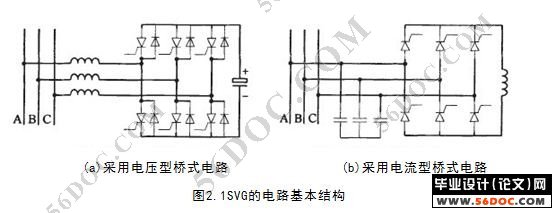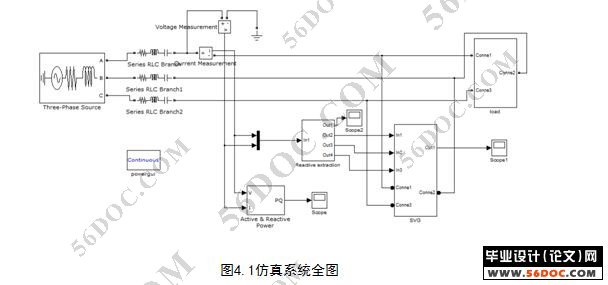静止无功发生器(SVG)装置的研究

1.无需注册登录,支付后按照提示操作即可获取该资料.
2.资料以网页介绍的为准,下载后不会有水印.资料仅供学习参考之用.
密 惠 保
摘要
随着电力电子技术的发展、各种用电设备对电能质量要求的不断提高,并伴随柔性输电的需要,电能质量中的无功补偿问题显得越来越重要。静止无功发生器(SVG)作为电力系统无功功率动态补偿的有效方法,逐步成为电力电子领域研究的热点。本文的研究目的是探讨SVG装置的几种控制策略的优劣之处,为SVG在实际中的应用提供理论参考。
本文提出了三种检算无功电流的算法:包括基于瞬时无功理论的p-q算法,ip-iq算法和基于电网电压和电流在旋转坐标系下进行坐标变换的dqo无功检测方法,通过在仿真平台上的试验,验证了ip-iq算法实现无功电流的提取以及无功检测精度的能力。同时,在三相三线制电压型静止无功发生器拓扑结构的基础上,论证了两种控制方法:间接电流控制和直接电流控制方法的滞环控制。
本文采用MATLAB软件对系统进行了仿真,完成了ip-iq检测方法的仿真及两种种控制方法仿真的比较。仿真结果验证了各种控制方法良好的无功补偿性能,表明所提出控制方法的有效性。
关键词:静止无功发生器;无功补偿;瞬时无功理论;MATLAB仿真
ABSTRACT
With the development of the power electronic technology and continuous improvement of power quality for power equipments,reactive power compensation of power quality is becoming more and more serious.Static Var Generator(SVG) is an efficient way to deal with reactive power dynamic compensation and it has become one of the hot points in power electronics fields.The purpose of this paper is to develop a set of SVG equipment with digital control system.
[资料来源:http://www.THINK58.com]
In this paper, three and calculation of reactive current algorithms: including those based on instantaneous reactive power p-q theory of algorithms, ip-iq algorithm and the grid voltage and current in the rotating coordinate system for coordinate transformation dqo reactive detection methods, by simulation test platform to verify the ip-iq algorithm reactive current extraction, as well as the ability of reactive power detection accuracy. Meanwhile, in the three-phase three-wire voltage STATCOM topology based on the argument of the two control methods: indirect current control and direct current control method of hysteresis control.
In this paper, MATLAB software to perform a simulation, the completion of the ip-iq test methods and two simulation comparison of various control simulation. The simulation results show a good variety of control reactive power compensation performance, show that the proposed method is effective.
Keywords: SVG;Reactive Power Compensation;Instantaneous Reactive Power Theory;MATLAB Simulation [资料来源:http://think58.com]
[来源:http://think58.com]


目录
摘要 II
ABSTRACT III
第1章 绪论 - 1 -
1.1无功补偿的意义和作用 - 1 -
1.1.1无功功率的产生和影响 - 1 -
1.1.2无功补偿的作用和意义 - 2 -
1.2 无功功率补偿装置的发展 - 3 -
1.2.1无功补偿装置发展史 - 3 -
1.2.2国内外研究现状 - 5 -
1.2.3 SVG发展趋势 - 8 -
1.3 选题的意义及研究内容 - 10 -
1.4本章小结 - 11 -
第2章静止无功发生器的基本原理 - 12 -
2.1 SVG工作原理 - 12 -
2.2 SVG工作特性 - 14 -
2.3 SVG主要优点 - 15 -
2.4 SVG 的控制方法介绍 - 16 -
2.4.1 间接电流控制 - 17 -
2.4.2 直接电流控制 - 22 -
2.5本章小结 - 24 -
第3章 无功电流检算 - 25 -
3.1 传统谐波和无功检测方法 - 25 -
3.2坐标变换及瞬时无功理论 - 26 -
3.2.1 p-q法 - 28 -
3.2.2 ip-iq法 - 30 -
3.2.3 dq0法 - 33 -
3.3本章小节 - 38 -
第4章 静止无功发生器控制系统仿真研究 - 40 - [资料来源:http://www.THINK58.com]
4.1 MATLAB/Simulink仿真技术概述 - 40 -
4.2 SVG仿真模型建立 - 41 -
4.3 仿真结果 - 45 -
4.3.1 ip-iq检测算法的MATLAB计算机仿真实现 - 45 -
4.3.2 SVG的控制仿真 - 47 -
4.4 小结 - 51 -
结束语 - 52 -
参考文献 - 53 -
致谢 - 54 -
[资料来源:www.THINK58.com]
